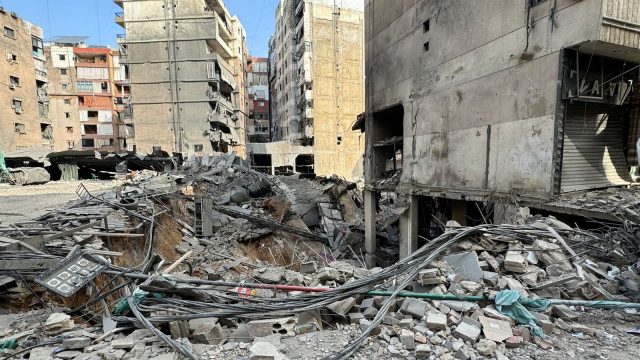Islamist terrorism may get a “further boost” from recent unrest in the Middle East, including the killing of the leader of Hamas, a former head of MI6 has warned.
Yahya Sinwar, the architect of the 7 October attack, was killed by Israeli troops following a chance encounter this week, after years of being hunted.
A former British intelligence chief said that his death along with anger around the unresolved “Palestinian question” and the violence people in Gaza see “every day” could fuel possible terror attacks beyond the Middle East.
Sir John Sawers, who led the Secret Intelligence Service in Britain for five years, told Sky News’ Sunday Morning with Trevor Phillips that with both Hamas and Hezbollah soon under new leaders, Islamist terror groups could turn their aim internationally, including to the UK.
He also said that intelligence agencies, including his own former employee, should “be very much on their toes”.
Speaking to Trevor Phillips he said: “[Islamist] terrorism may actually get a further boost, if that’s the right word, from events in the Middle East.
“The frustrations that we’ll be seeing because of the lack of movement on the Palestinian question, because of the violence people are witnessing every day.
“And it could be that Hezbollah and Hamas, the new leaderships there are focused so much on violence that they’ve become not just terrorist organisations designated by Western countries and aimed against Israel, but they could revert back to international terrorism, including here in the UK.
“So I think MI5, the police, the other intelligence agencies like my former one, MI6, they need to be very much on their toes, to watch out for a further rise in Islamic terrorism. I am absolutely confident that they are exactly doing that.”
This comes after MI5 director general Ken McCallum recently said the terror threats to the UK are about 75% Islamist terrorism and 25% far-right threats.
Sinwar’s legacy
Speaking on the same show, president of the Palestinian National Institute Mustafa Barghouti told Sky News that Sinwar would be remembered as a “person who fought for his country and who fought for his people and not as a terrorist”.
Read more:
World ‘will not tolerate more excuses’ from Israel
Who was Yahya Sinwar?
Reaction to Sinwar’s death reflects Middle East complexities
Mr Barghouti argued that the 7 October attack was the result of what he alleged was “ethnic cleansing” of Palestinians by Israel stretching back to 1948.
Mr Barghouti, who said he had been a long-term advocate of non-violence, said: “But, in my opinion, the killing of Sinwar will not really help or improve the situation because Sinwar was not the obstacle to achieving a ceasefire.”
He repeatedly stressed the number of children killed by Israel in its war in Gaza and said: “The problem with most of Western media is that you present a situation as if the killing of an innocent Israeli civilian is a terrorist act.
“While the killing of … you never say it, that the killing of 17,000 children, Palestinian children, is an act of terrorism and that the terrorist in this case is Netanyahu and his Israeli government.”
This comes as the Hamas-affiliated Gaza health ministry said that 42,603 people had been killed since 7 October.
This figure does not distinguish between civilians and fighters, but while Israeli officials have cast doubt on the numbers killed in Gaza, several independent groups say the ministry’s figures have proved to be largely reliable and broadly in line with those later produced by the UN and Israel itself.
👉 Click here to listen wherever you get your podcasts 👈
Examination of data from previous Gaza conflicts, comparing the ministry’s counts with the post-war United Nations analysis, shows the initial data is largely accurate with, at most, a 10-12% discrepancy.
The Israeli military told Sky News earlier this month that 20,000 Hamas militants had been killed, but this remains unverified.


















